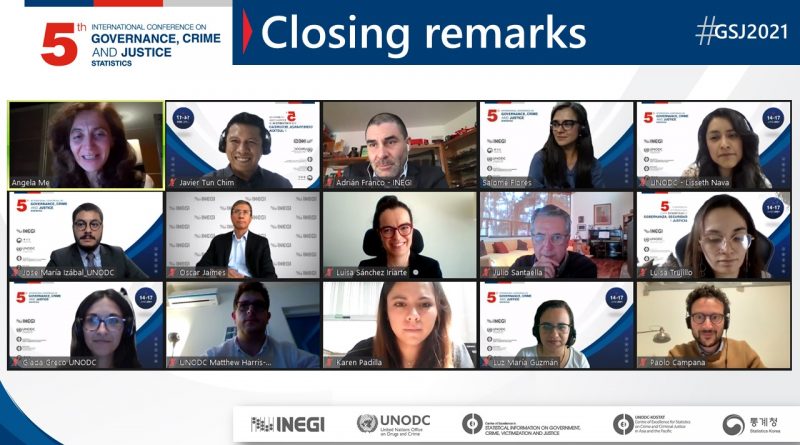Fourth day of GSJ2021: Measurement of corruption, illegal governance, gender violence and pandemic
Mexico City, 17 June, 2021. UNODC, through the Center of Excellence for Statistical Information on Government, Crime, Victimization and Justice (CoE) in Mexico, successfully concludes the fourth and last day of the 5th International Conference on Governance, Crime and Justice Statistics (GSJ2021).
This last day of the conference brought with it the presence of expert panelists who unveiled the existing challenges on the new agenda for measuring corruption, the fight against illegal governance, as well as the impact of COVID-19 on the statistics on crime, the presence of organized crime and domestic and gender violence.
In the first session A new agenda for corruption measurement, the possibilities of improving the corruption agenda were discussed, understanding the dimensions of how, what, who, where, when and why to measure corruption. It must be done at a local, national and global level, taking into account the resources that this implies. Studies of measurement and use of data science analytical tools were presented to generate methodologies that can be scalable and replicable, taking into account the size of the territory and the size of the population.
In the second session Tackling illegal governance starts by understanding it, a fairly robust definition of organized crime was presented, determined by production, trade, and governance, a concept with which it was determined its impact in the area of corruption. Studies were also presented at the local level to analyze the level of illegal governance, the mechanisms of fear and social coercion used by organized crime and the causes for which its services are used, in comparison with the services provided by the state towards the community. This session focused on relating organized crime with society, as well as its impact on the governance and sustainable development of the territories.
In the third session, Impact of COVID-19 on crime statistics: challenges and opportunities, it was brought to light how crime statistics provided accurate evidence at the local and global level that violence against women and children had increased significantly. It was recognized that police data are underestimated, that there are no crime statistics related to children and that the pandemic exacerbated domestic violence due to lack of employment, health problems and loss of privacy. These were risk factors that were already latent, but that were exacerbated by the presence of the pandemic. The fear that women have that the law will be applied to their perpetrators was also discussed.
We thank the participation of today’s panelists: Alina Mungiu-Pippidi, Adrián Franco, Lucio Picci, Laarni Escressa, Mounu Prem, Zef Preci, Alexandra M. Habershon, Federico Varese, Johanna Skinnari, Santiago Tobón, Salomé Flores, Flavia Bustreo, Leila Wood, Catherine Kaukinen, Dabney Evans. And also, to our moderators: Roberto Martinez B. Kukutschka, Paolo Campana and Alex R. Piquero.
Finally, the 5th International Conference on Government, Crime and Justice Statistics was closed, extending gratitude to the 69 experts who shared their knowledge and research, to the audience, as well as to the technical and organizing team. The advantages of the use of technology were recognized giving the opportunity for this 5th Conference to be held online, which allowed to have more than 2000 participants along the 4 days. Future challenges were mentioned: the production and dissemination of statistics in real time, the modernization of criminal justice systems and the use of technology to make visible victims and perpetrators. This, for the ultimate goal of reducing and preventing violence in all its forms.



